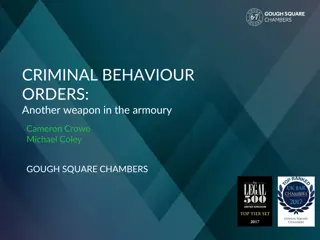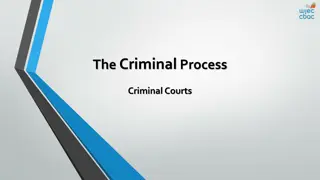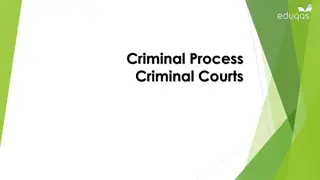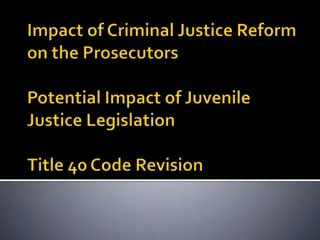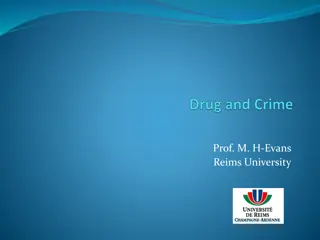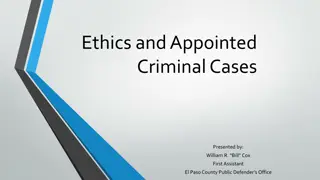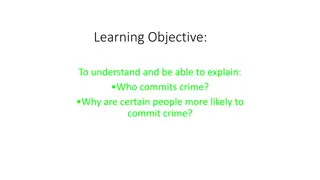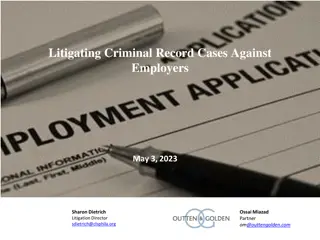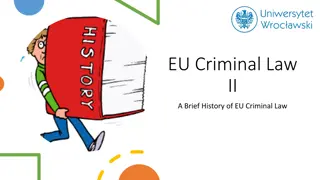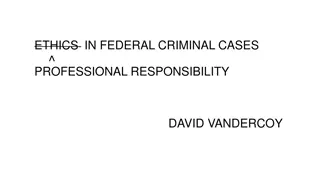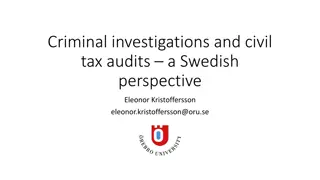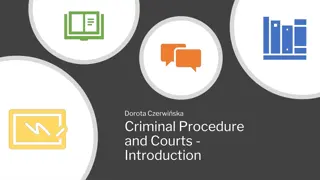Overview of EU Criminal Law: Classes, Exam, and Directives
This content provides detailed information on substantive and procedural aspects of EU Criminal Law, covering classes, terms of participation, exam details, and specific directives. It includes guidelines on passing the classes through active participation, presentations, and exams. The schedule out
3 views • 13 slides
Latest Updates in Criminal Law 2023: Key Cases and Sentencing Considerations
Explore the significant developments in criminal law for 2023, covering key cases involving intensive corrections orders, sentencing discounts for guilty pleas, evidence in psychiatric reports, relevance of personality disorders in sentencing, and more. Delve into the nuances of legal decisions shap
0 views • 13 slides
United Nations Survey on Crime Trends and Operations of Criminal Justice Systems
The United Nations Survey on Crime Trends and Operations of Criminal Justice Systems (UN-CTS) focuses on harmonizing data collection, identifying crime patterns, improving monitoring of the criminal justice system, and enhancing international comparability of crime statistics. It was mandated by the
3 views • 18 slides
Harmonisation of Substantive Criminal Law in the EU
The Treaty of Lisbon serves as a legal foundation for the harmonisation of substantive criminal law within the European Union. It establishes the basis for judicial cooperation, mutual recognition of judgments, and approximation of laws across Member States. The treaty allows for the establishment o
2 views • 60 slides
Presentation on Police Misconduct Cases by Independent Police Investigative Directorate (IPID) - Strategic Plan 2012/17 Joint Meeting
IPID, as an oversight body, investigates cases involving the police as mandated by the IPID Act. This presentation covers the legislative mandate, total case intake, COVID-19 related cases, gender-based violence cases, and comparisons of cases received. It also highlights cases related to police act
0 views • 23 slides
Understanding Criminal Behavior from a Social Psychological Perspective
This unit delves into the application of social psychology in the legal system, exploring the nature of criminal behavior, responses to criminal acts, the criminal justice system, and rehabilitation. It examines the social ecological perspective of criminal acts and outlines key points related to th
0 views • 50 slides
Understanding Psychological Theories of Criminal Behavior
Psychologically-based criminologists attribute criminal behavior to individual factors such as negative early childhood experiences and inadequate socialization, leading to criminal thinking patterns and incomplete cognitive development. Probation and parole practices are influenced by rehabilitatio
0 views • 30 slides
Understanding Criminal Law and Procedure: Greenvisor's Case
A case study involving embezzlement by Joe Greenvisor, the chief accountant of Nobreath Corporation, sheds light on criminal acts, duties, intent, and societal perspectives on crime. Despite Greenvisor's charitable intentions, his actions constituted a crime under the law. The elements of criminal a
0 views • 47 slides
Understanding Criminal Offences: A Comparative Analysis
Exploring the concept of criminal offences, this article delves into the definitions in common law and continental law systems. It discusses the structural elements, harmful nature, prohibition, punishment, and distinctive aspects of criminal acts. A comparison between common law and continental law
1 views • 33 slides
Understanding Software Testing: Test Cases, Selection, and Execution
Software testing plays a crucial role in identifying and resolving issues within software products. Test cases, selection, and execution are fundamental aspects of the testing process. Test cases define conditions for testing software functionality, with a focus on repeatability and data specificity
2 views • 36 slides
Eyewitness Testimony in Criminal Justice Cases
Eyewitness testimony plays a significant role in criminal investigations and court verdicts. Two cases, one involving a wrongful conviction and the other a successful rescue, illustrate the impact of eyewitness accounts on legal outcomes. The stories of Jennifer Thompson and Mary Katherine provide i
0 views • 27 slides
Importance of Legal Drafting in Criminal Law by Rajasthan State Legal Services Authority
In the realm of criminal law, the significance of precise and careful legal drafting cannot be overstated. Pleadings play a crucial role and must be drafted meticulously. The presentation sheds light on various aspects of legal drafting in criminal cases, including applications, appeals, revisions,
1 views • 5 slides
Trial of Summons Cases by Magistrates - Overview and Procedures
Trial of summons cases by magistrates involves the process of handling offenses that are not warrant cases and do not carry severe punishments. The accused is informed of the charges, given the opportunity to plead guilty or provide a defense. The procedures for summon cases ensure that the accused
0 views • 20 slides
Understanding the Process of Sealing Criminal Records
Having a criminal record sealed means making it inaccessible to the public while keeping it available to criminal justice agencies. Eligibility for sealing records requires taking action, and not everyone qualifies. This clinic provides guidance on the sealing process and the types of records that c
0 views • 36 slides
Understanding the Roles in Criminal Justice System
The criminal justice system involves three branches of government, each with specific responsibilities, operating at federal, state, and local levels. Law enforcement is primarily a local government function, while legislatures determine criminal laws and punishments. Statutes organized into codes d
0 views • 35 slides
Understanding Substantive Criminal Law in the American Legal System
Substantive criminal law encompasses the definition of criminal acts and penalties, with a core principle being that there can be no crime without a corresponding law. The American legal system follows the Rule of Law, ensuring that all individuals are subject to legal governance. Constitutional lim
0 views • 22 slides
Confiscation in the Criminal Courts: A Guide to Proceeds of Crime Law
Confiscation in the criminal courts involves depriving defendants of benefits gained from criminal conduct within their means. The Proceeds of Crime Law in the Cayman Islands sets guidelines for these proceedings, emphasizing that confiscation is not a form of punishment but aims to recover obtained
3 views • 17 slides
Understanding the Process of Sealing Criminal Records
Sealing criminal records means restricting public access to the records, although they are not destroyed and remain accessible to certain entities. Eligibility requirements vary, and action must be taken to seal records. This presentation covers the process, eligibility criteria, and what to expect
1 views • 36 slides
Understanding Civil and Criminal Complaints in Legal Cases
Explore the distinctions between civil and criminal complaints in legal scenarios. Learn how a civil case seeks monetary damages while a criminal case pursues punishment for wrongful actions. Understand the roles of plaintiffs and prosecutors, burden of proof, and outcomes in both civil and criminal
0 views • 34 slides
Briefing on the Criminal Procedure Amendment Bill [B12-2021] to the Portfolio Committee on Justice and Correctional Services
The Criminal Procedure Amendment Bill aims to address the constitutional invalidity of section 154(3) of the Criminal Procedure Act by enhancing protection for child victims, accused, and witnesses in criminal proceedings. The Bill proposes prohibiting the publication of information revealing their
0 views • 12 slides
Understanding Criminal Behaviour Orders: An Overview and Legal Requirements
Criminal Behaviour Orders (CBOs) are issued following conviction for criminal offences to tackle serious and persistent anti-social behavior. This talk provides an overview of CBOs, legal requirements, when they are appropriate, and practical tips for implementation. The orders can prohibit or requi
0 views • 12 slides
Understanding Criminal Homicide and Its Classifications
Considered a crime against the person, criminal homicide encompasses various degrees including first-degree murder, second-degree murder, manslaughter, involuntary manslaughter, and negligent homicide. Each degree is characterized by specific elements such as premeditation, malice, intent, and reckl
0 views • 8 slides
Asset Recovery Practices in England and Wales: Criminal vs. Civil Proceedings
Asset recovery in England and Wales involves a combination of criminal and civil proceedings to secure justice and return funds to victims of crime. The CPS's Proceeds of Crime Division plays a crucial role in obtaining Restraint Orders and Confiscation Orders. Civil recovery, focusing on illicit fi
0 views • 11 slides
Understanding the Criminal Justice System in Court Proceedings
This content explores various aspects of the criminal justice system, including the adversarial system, classification of offenses, criminal court systems, trial procedures, plea bargaining, and more. It covers models of criminal justice systems, classification of offenses, modes of trial, sending f
0 views • 15 slides
Overview of the Criminal Justice System
Exploring the complexities of the criminal justice system, this content delves into the adversarial system, classification of offenses, criminal court system, modes of trial, plea bargaining, trial procedures, and various criminal process models.
0 views • 15 slides
Impact of Criminal Justice Reforms on State Courts and Prosecutors
Changes in crime classifications and sentencing laws, along with the emphasis on Accountability Courts, are reshaping the criminal justice landscape in the state. Key changes include alterations to theft, burglary, and controlled substance laws, impacting the workload of state courts and prosecutors
0 views • 20 slides
The Statistical Association Between Substance Misuse and Criminal Behavior
This brief synthesis discusses the statistical association between substance misuse (specifically drugs and alcohol) and criminal behavior. It draws upon meta-analyses investigating the links between drug use and crime, as well as alcohol consumption and violent behavior. Various theories are explor
0 views • 12 slides
Evolution of Criminal Law and Thought: From Pre-Classical Era to Enlightenment
Explore the progression of criminal law and thought from the Pre-Classical School of Thought to the Enlightenment era. Delve into concepts like folkways, mores, and the origins of criminal law, including examples such as societal norms, dress codes, and supernatural explanations for behaviors during
0 views • 23 slides
Spotting Winning Disability Cases: A Guide from Asha Sharma and Paul McGrath
Spotting Winning Disability Cases guide provided by Asha Sharma and Paul McGrath from Disability Partners, PLLC in St. Paul, Minnesota. The guide covers case selection criteria, training staff to spot winning cases, and useful tips for representing clients in disability cases. The firm assists clien
0 views • 24 slides
Epidemiology of Hepatitis B and C in Florida: 2019 Data Analysis
The Department of Health in Florida has released the 2019 data on the epidemiology of Hepatitis B and C as of January 21, 2021. The report includes information on acute and chronic cases, technical notes on case definitions, and changes in national case definitions in 2020. Acute cases require speci
0 views • 35 slides
Ethical Practices in Appointed Criminal Cases
Presentation by William R. Bill Cox, First Assistant at El Paso County Public Defender's Office, covering ethics in criminal cases, controlling laws in Texas, top practice areas for grievances, common complaints, client communication protocols, duties upon appointment in a criminal case, and client
0 views • 26 slides
Exploring the Factors Behind Criminal Behavior
Understanding who commits crime and why certain individuals are more likely to engage in criminal activities involves exploring a range of social and biological factors. While biology suggests a genetic predisposition to criminal behavior, sociology emphasizes the influence of social factors like fa
0 views • 9 slides
Understanding Title VII and Criminal Records in Employment Discrimination Cases
This presentation delves into the intersection of Title VII and criminal records in employment discrimination cases. It covers the lack of specific protections for individuals with criminal records under Title VII, the implications of disparate impact cases, and the development of standards in the c
0 views • 15 slides
Asset Recovery: The Irish Approach towards Criminality
The paper discusses the emergence and structure of the Criminal Assets Bureau (CAB) in Ireland, highlighting the shift in approach towards dealing with criminal activities and the focus on targeting the proceeds of crime. It explores the operational positions and approaches adopted by CAB, emphasizi
0 views • 7 slides
Evolution of EU Criminal Law Through Cooperation and Commitment
The history of EU criminal law traces back to the Treaty of Rome in 1957 when the EU initially focused on economic matters. Over the years, with the judgment in the Stauder case in 1969 and the formation of the TREVI group in the 1970s, cooperation on security and combating terrorism laid the founda
0 views • 59 slides
Professional Responsibility and Ethics in Federal Criminal Cases
Understand the ethical considerations and rules that guide lawyers in federal criminal cases, including the importance of maintaining fairness, avoiding prejudice, and balancing the rights of clients with public interest. Explore cases like Gentile v. State Bar of Nevada and learn about the allocati
0 views • 49 slides
Dallas Criminal Attorney | Frisco Criminal Attorney- Reggie London
Dallas Criminal Attorney: Dedicated Team of Criminal Defense Lawyers Led by Reggie London, Known for Unwavering Reliability and Steadfast Support. \/\/reggielondonlawyer.com\/
2 views • 7 slides
Exploring Criminal Law Basics
Delve into the fundamentals of criminal law through topics such as the definition of crime, the elements of a crime, why we have criminal law, and real-life scenarios to understand legal concepts. Discover the significance of criminal law in maintaining safety, encouraging good behavior, and promoti
0 views • 27 slides
Understanding the Interaction Between Criminal Investigations and Civil Tax Audits in Sweden
The relationship between criminal investigations and civil tax audits in Sweden is explored, highlighting how tax audits and criminal proceedings run concurrently. The mens rea requirement for criminal sanctions and tax surcharge, as well as the integration between criminal sanctions and tax surchar
0 views • 13 slides
Fundamentals of Criminal Law and Procedure
Explore the key aspects of criminal law and procedure, including definitions of crime, the role of criminal procedure, sources of law, phases of the criminal process, participants involved, and rules of evidence in legal proceedings. Gain insight into how criminal law is distinct from civil law and
0 views • 24 slides

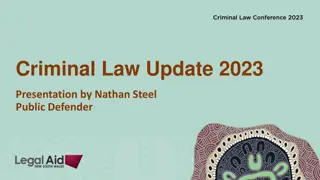


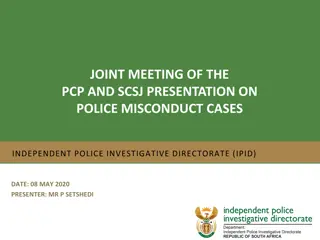


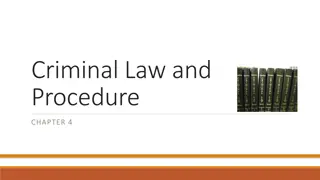

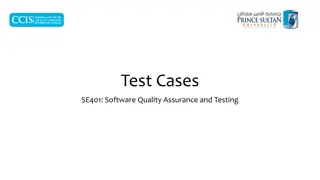
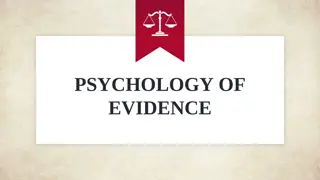
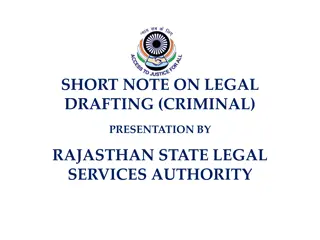
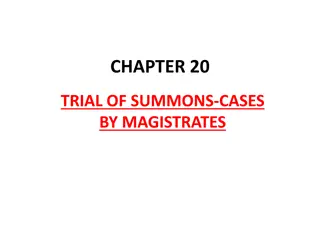

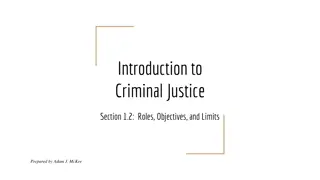
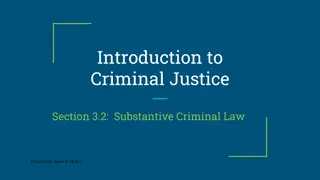
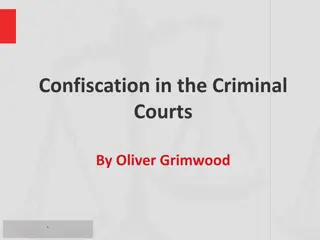


![Briefing on the Criminal Procedure Amendment Bill [B12-2021] to the Portfolio Committee on Justice and Correctional Services](/thumb/157093/briefing-on-the-criminal-procedure-amendment-bill-b12-2021-to-the-portfolio-committee-on-justice-and-correctional-services.jpg)
